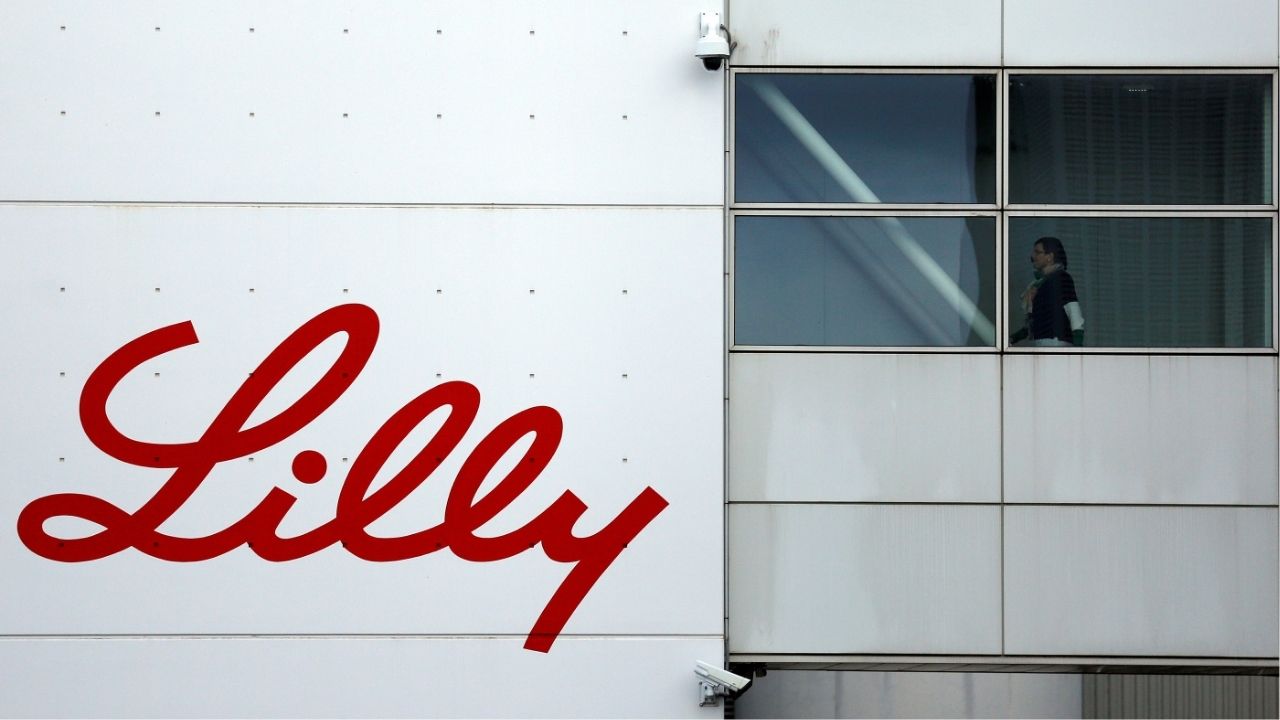The logo of Lilly is seen on a wall of the Lilly France company unit, part of the Eli Lilly and Co drugmaker group, in Fegersheim near Strasbourg, France, February 1, 2018. Picture taken February 1, 2018. (REUTERS/Vincent Kessler)

- Eli Lilly’s oral drug matched Ozempic in weight loss, giving hope for a simpler alternative to injection treatments.
- Patients lost nearly 8% body weight in 40 weeks; blood sugar also dropped, with no liver safety concerns reported.
- Shares surged 13% as results showed tolerable side effects, positioning Lilly to dominate the future oral weight-loss market.
Share
|
Getting your Trinity Audio player ready...
|
(Reuters) – Eli Lilly’s experimental pill worked as well as blockbuster drug Ozempic to lower weight and blood sugar in a trial of diabetes patients, and the company said it expects to seek regulatory approvals by the end of the year.
Shares jumped 13.3% as the results of the long-awaited trial, the first of several underway on the pill, orforglipron, raised hopes of an effective and easy-to-use treatment reaching a market dominated by weight-loss injections.
The trial showed that type 2 diabetes patients lost 16 pounds, or nearly 8% of their body weight, over 40 weeks. That compares favorably with Novo Nordisk’s injected drug Ozempic, where diabetic patients on the highest dose lost roughly 6% of their body weight.
Lilly said patients hadn’t yet reached a weight plateau at the time the study ended, indicating that patients might lose more weight. The pill lowered blood sugar levels by an average of 1.3%. Ozempic lowered blood sugar levels by 2.1%.
Several companies around the world are developing weight-loss pills, a more convenient option than injections, encouraged by estimates that sales of obesity treatments could hit $150 billion in the coming years. The latest data puts Lilly firmly in the lead in the race for effective oral drugs that can compete with injections.
Lilly Said Orforglipron’s Safety Profile Was Consistent
Lilly said orforglipron’s safety profile was consistent with other drugs belonging to the class of weight-loss treatments known as GLP-1s, allaying some worries over a potential stumbling block to sales.
The “data is fantastic from an efficacy standpoint,” said Kevin Gade, chief operating officer at Bahl & Gaynor, which owns Lilly’s shares.
Lilly said it would report data from another trial for the pill for weight management later in the year. It plans to file for approval with global regulators for weight loss by end of this year and for diabetes next year.
“While this trial alone is very good, this just bodes extremely well for their trial in obesity patients,” said Gade.
The late-stage trial found that 13% to 18% of patients given the drug experienced nausea across doses, compared with 2% on placebo. The rate for diarrhea was 19% to 26% and vomiting 5% to 14%.
“With some concern of elevated rates of nausea and vomiting heading into today’s readout, these result firmly validate the tolerable profile of orforglipron,” said BMO Capital Markets analyst Evan Seigerman.
On Monday, Pfizer discontinued development of its experimental weight-loss pill danuglipron after a trial patient experienced potential drug-induced liver injury that resolved after the medication was stopped.
Lilly said no liver-related safety signal was observed in its trial.
The company said 8% of patients on orforglipron’s highest dose discontinued treatment due to adverse events.
Levels of HbA1c, a measure of blood sugar over time, fell by an average of 1.3% to 1.6% across doses.
Analysts at TD Cowen, in a recent research note, said a “rough bar” for the orforglipron trial was HbA1C lowering of 2%, weight loss of 7% and a discontinuation rate of 9%.
After 40 weeks of treatment in the multi-dose trial, Lilly said once-daily orforglipron showed body weight reductions of 4.7% at 3 milligrams, 6.1% with 12 mg, and 7.9% with 36 mg. Patients on placebo lost 1.6%.
Data from rival Novo Nordisk’s mid-stage trial of its pill came in below market expectations last year. Novo’s U.S.-listed shares slipped 7%, while those of smaller drug developer Viking Therapeutics were down 3%.
Shares of Structure Therapeutics, which is also developing a GLP-1 pill, rose 9%.
Readily Manufactured
Lilly said it was confident in its ability to launch orforglipron worldwide without supply constraints, if approved. The company recorded $550 million related to the drug’s inventory in its financial statements in February, a filing showed.
The company currently sells injectable tirzepatide — under the brand names Mounjaro for obesity and Zepbound for weight loss — which mimics GLP-1 and a second hormone called GIP.
Orforglipron also targets GLP-1, but unlike hormone-mimicking peptides, it is a synthetic small molecule drug.
Experimental pills such as orforglipron could mean wider access to effective weight-loss options since the manufacturing is simpler.
—
(Reporting by Bhanvi Satija, Manas Mishra and Christy Santhosh in Bengaluru and Deena Beasley in Los Angeles; Editing by Shinjini Ganguli and Sriraj Kalluvila)
RELATED TOPICS:
Categories

Fresno County Authorities Seek Help Locating Missing Woman


















